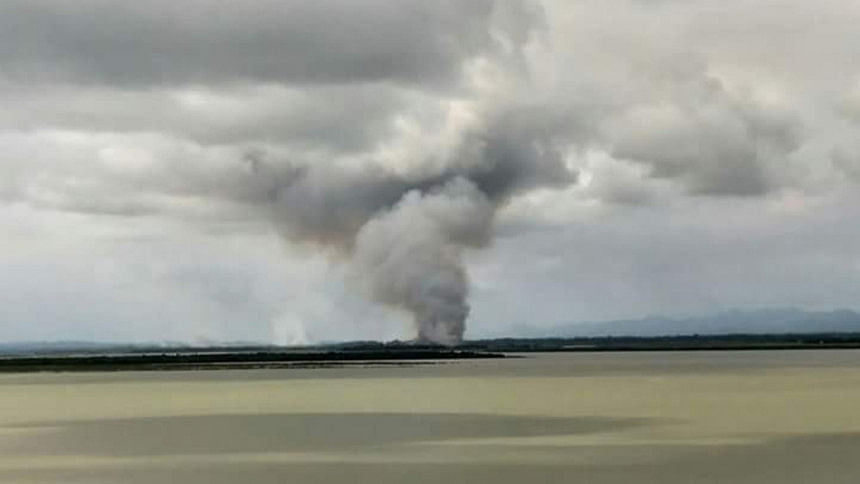If not Myanmar's, whose responsibility is it?

Aung San Suu Kyi's opting out of the UN General Assembly session is a reflection of the same hiding syndrome that made the Rakhine state out of bounds for UN staff, aid agencies and the media for a long while. Then they gave a conducted tour of the burning villages claiming they were set ablaze, not in pursuit of a scorched earth policy but by the departing Rohingya Muslims. Warped logic!
Suu Kyi's wilful absence from an annual UN appearance was prompted by diffidence to face hard truths as well as measure up to accountability standards even in a diplomatic world.
It is as a hostage to the Myanmar military who had suppressed and bulldozed her electoral victory in 1990 that she garnered world's sympathies, especially those of the powerful west. She won the Nobel Prize for Peace, was freed from jail and headed an elected civilian government based on power sharing with the military. All that was handled with a delicate touch by outsiders lest an embryo of a democracy were unceremoniously killed off.
They were generous. Sanctions were lifted from the country; Myanmar was declared open to business and investments poured in.
But the cycle seems to have been reversed at least in perception. On the eve of the UNSC meet on the deteriorating Rohingya scenario, Devjyot Ghoshal wrote from New York for Quartz India, "A strong censure from the UNSC—which includes the US and UK, both of which have historically backed Suu Kyi—is not enough to pressure the Myanmar government to stop the brutality, the Council can potentially consider imposing sanctions, including travel bans, and asset freezes." Again Aung San Suu Kyi is held hostage to the military but this time her conscience is being bartered away to an unprincipled narrative.
The country's establishment, especially the military and a strong Buddhist lobby worked behind the shield of her reverential image to deliver a pernicious stroke of ethnic cleansing a la Yugoslavia and Bosnia-Herzegovina. It is believed that she is on the same page as the army commanders and the Rakhine Buddhists, insofar as considering all Rohingya Muslims as combatants goes.
It defies belief how a "ramshackle" Rohingya Salvation Army, as a foreign media person has described it, can offer challenges of insurgency or terrorism to a well organised and fully equipped Myanmar security force. The August raid triggered a series of reprisals that to observers have not only been disproportionate but directed against innocent civilians as well. Besides, the Myanmar atrocities have been well-documented since 1990 through 2012 to 2017, if not earlier.
In contrast, Kochin and Karen fighters had taken up arms against the government forces. Altogether, eight ethnic entities have been party to a National Ceasefire Agreement. Since the Rohingya Muslims are not one of the 135 ethnic communities recognised by the Myanmar government, the Rohingya Salvation Army's ceasefire offer has been met with a prompt disapproval from the Myanmar authorities.
How are Aung San Suu Kyi, the Myanmar military and the Rakhine Buddhists so brazen—faced in their omissions and commissions?
China, India and Russia can wield a moral influence on Myanmar. Allowing for their quest for geopolitical or economic power equations, can't they be stirred to have empathy for those poor, scarred, hapless children, widowed women and traumatised old men who appear live on TV screens 24/7?
For our part, we shoulder a humanitarian responsibility of an enormous scale with a great strain endured on our economy and environment. Along with providing food, shelter, sanitation, security to the refugees, the able bodied need to be employed gainfully in their habitats.
It is good to know that their biometric data are being collected with ID cards being issued to the refugees and their particulars kept handy.
The United Nations called for massive amounts of assistance to be delivered in the areas the refugees are sheltered. As the UN Observer in Cox's Bazar has pointed out, "We are dealing with emergencies within an emergency" so coordination is key.
Let me suggest that we create a pool of expertise drawing on the experiences of Lebanon, Jordan, Iran, and perhaps Turkey, countries that have had to contend with huge numbers of refugees on their soil.
Shah Husain Imam is a commentator on current affairs and former Associate Editor, The Daily Star. Email: [email protected]





Comments